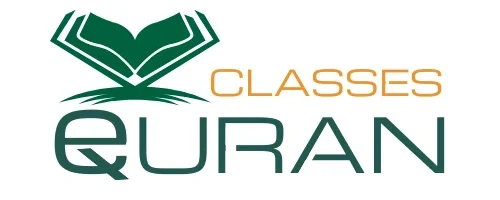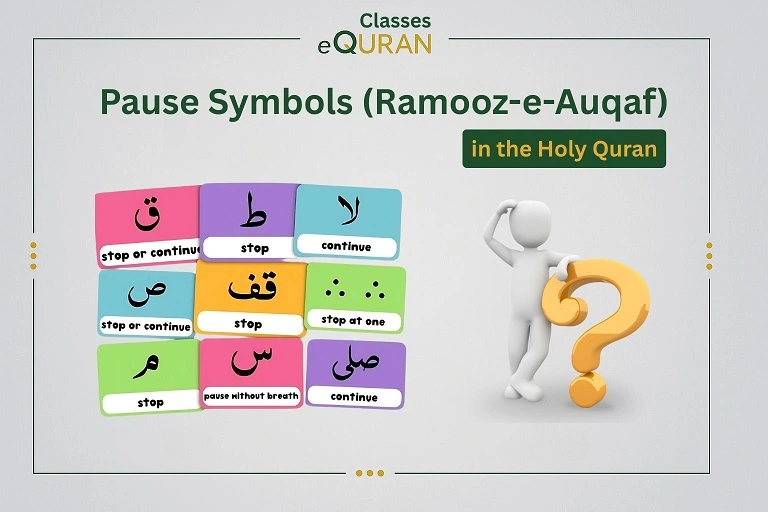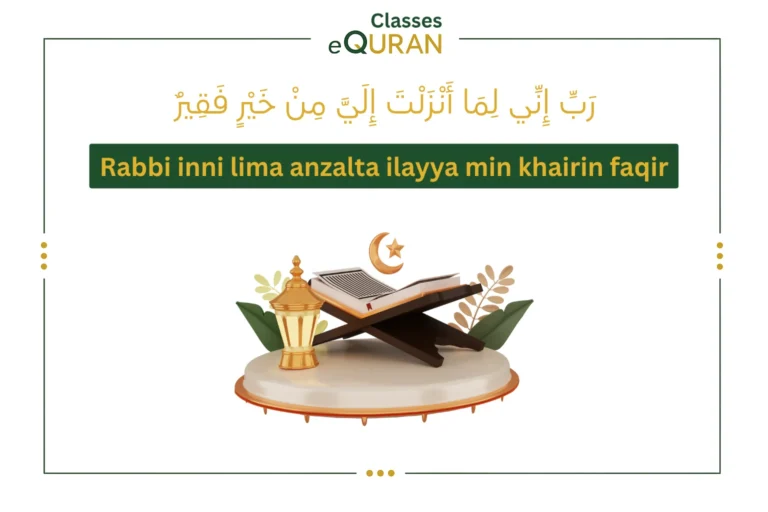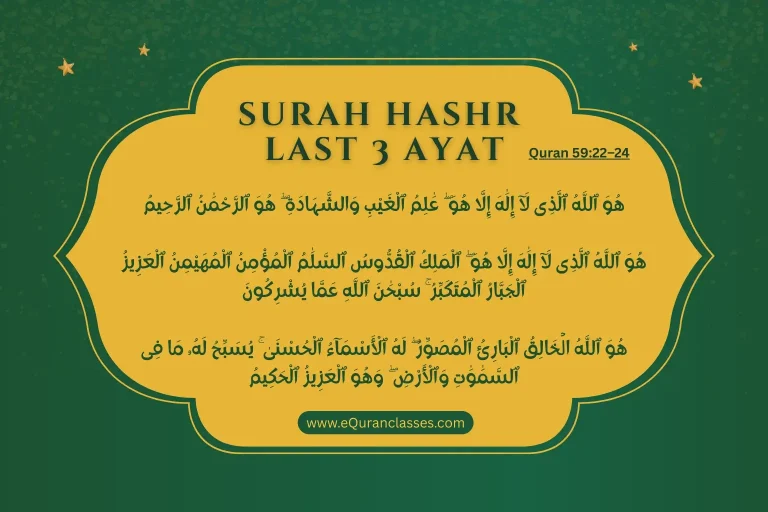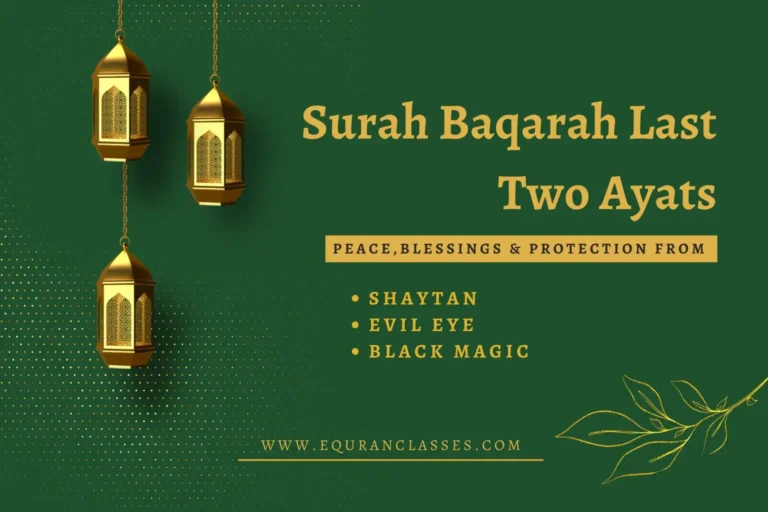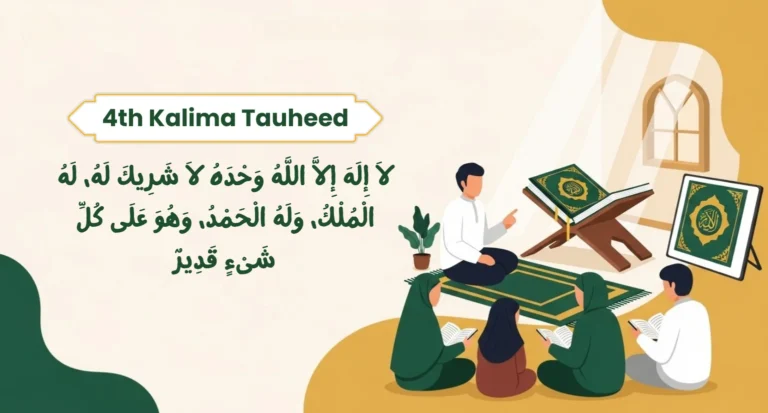Learn 1 to 6 Kalma in English & Arabic with eQuran Classes
What Are the Six Kalmas in Islam?
The Six Kalimas are concise, powerful declarations of faith that every Muslim should be familiar with. They affirm Allah’s oneness, Muhammad’s prophethood, and core Islamic beliefs. Reciting them strengthens your connection to Islam, like a promise to Allah. In Pakistan, India, and South Asian communities worldwide, kids and adults learn these Kalmas to build their faith.
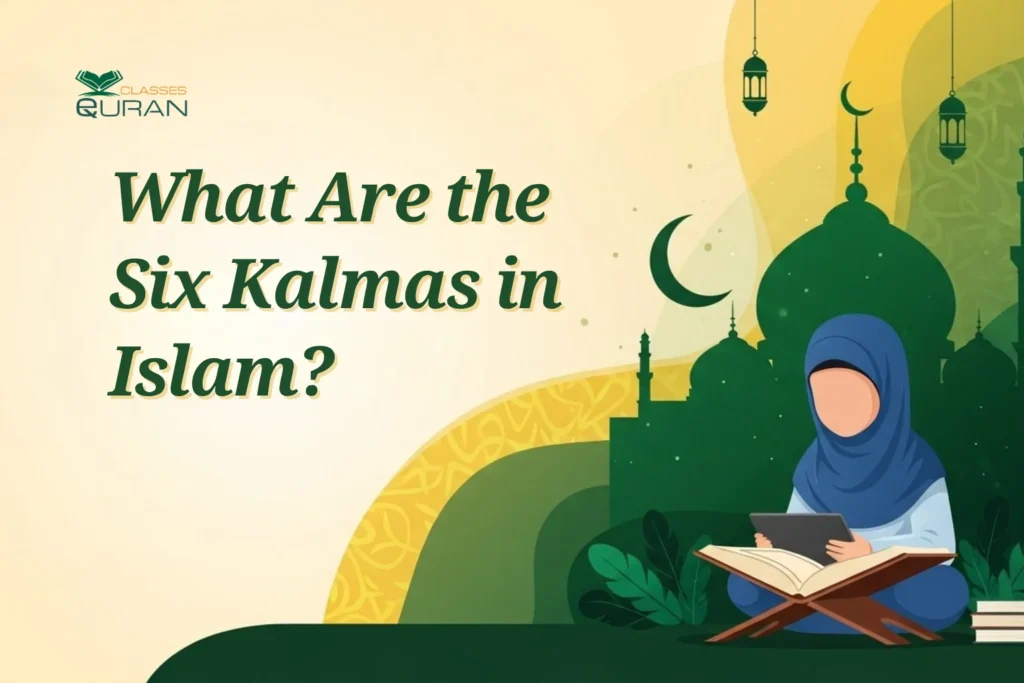
Each Kalma has a special purpose. The 1st Kalma declares Allah’s oneness, while the 5th seeks forgiveness for sins. Muslims in the UK and the US use them in daily worship, too. They’re rooted in Hadith, like Kanz al-Ummal: “There is no deity but Allah, Muhammad is the messenger of Allah” (Vol. 1, p. 55). South Asians teach their kids for aqeeda (belief) and dhikr (remembrance of Allah).
Our eQuran Classes make learning the Kalmas easy for everyone. Whether you’re a new Muslim in London or a parent in Melbourne, our tutors guide you. Want to know more about the Kalmas’ meaning? Keep reading to master your faith, Insha’Allah!

Why Learn the Six Kalmas? Spiritual and Practical Benefits
The Six Kalmas ignite your faith and bring you closer to Allah. Reciting them seeks forgiveness, strengthens Iman, and guards against disbelief. The 5th Kalma asks pardon for sins, offering peace to your heart. The 6th Kalma rejects shirk, protecting your belief, as Hadith teaches: “Whoever says لَا إِلَٰهَ إِلَّا ٱللَّٰهُ مُحَمَّدٌ رَّسُولُ ٱللَّٰهِ, Allah will not punish him” (Kanz al-Ummal, Vol. 1, p. 57).
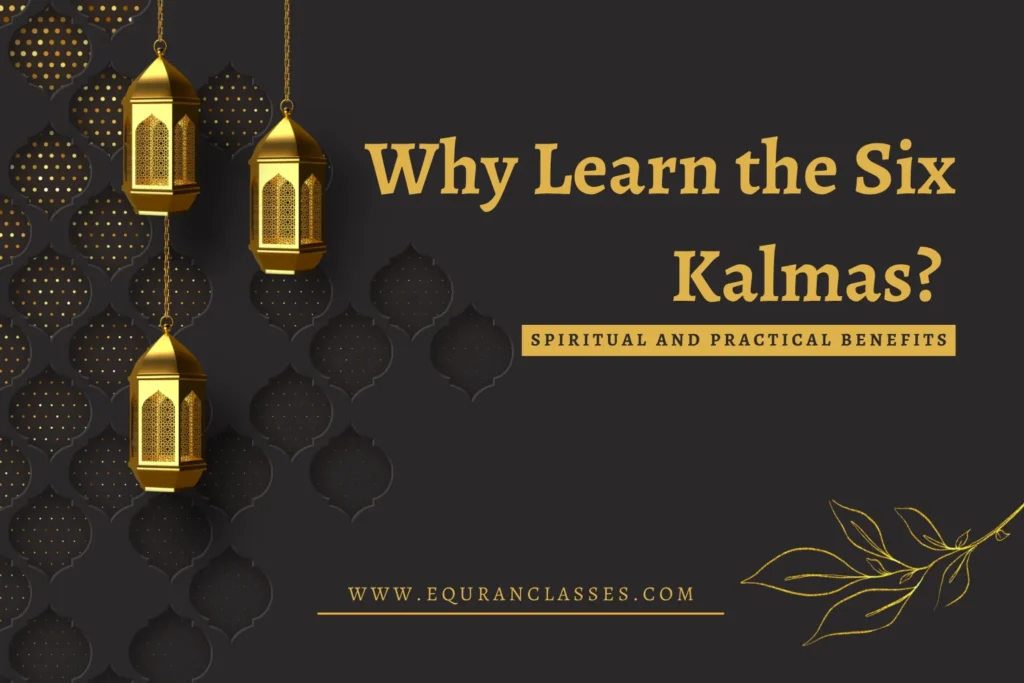
Children develop morally by learning Kalmas, cultivating honesty and gratitude. Parents in Lahore love this for their children. New Muslims in the US establish a faith foundation by mastering core beliefs. Non-Arabic speakers in Pakistan learn easily with our transliterations. Reciting Kalmas daily, like praising Allah in the 3rd Kalma, deepens worship. Join eQuran Classes to embrace these benefits with expert tutors, Insha’Allah!
First Kalima: Tayyab (Purity)
The First Kalima, Tayyab, declares Allah’s oneness and Muhammad’s prophethood. Recite it:
لَا إِلَٰهَ إِلَّا ٱللَّٰهُ مُحَمَّدٌ رَّسُولُ ٱللَّٰهِ
اللہ کے سوا کوئی معبود نہیں محمدﷺ اللہ کے رسول ہیں
(lā ʾilāha ʾillā -llāhu muḥammadur rasūlu -llāhi). It means: There is no deity but Allah, and Muhammad is His messenger. This Kalma anchors your faith, as Kanz al-Ummal says: “Whoever says it, Allah protects” (Vol. 1, p. 55).
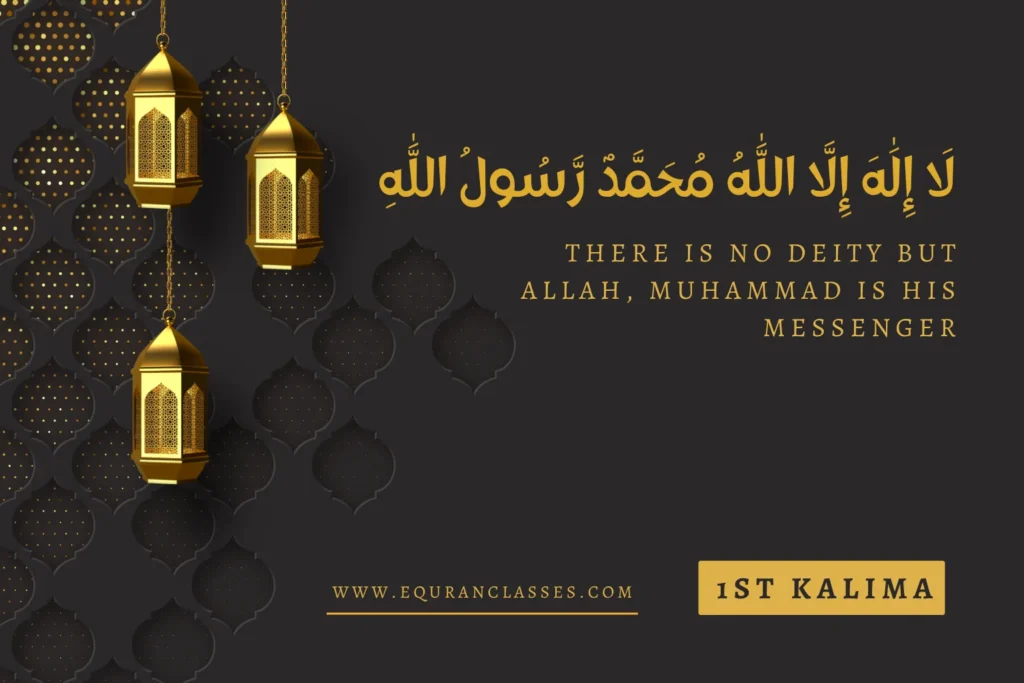
For kids in London or New York, it’s like a promise to Allah. Say “laa” with a soft throat sound and “ha” deeply, per Makharij rules. Our certified teachers guide you. Download our free PDF and audio guide to practice, perfect for new Muslims in the US! Join eQuran Classes to master the 1st Kalma, Insha’Allah!
Second Kalima: Shahadat (Testimony)
The Second Kalima, Shahadat, affirms your faith in Allah and Muhammad. Recite it:
أَشْهَدُ أَنْ لَا إِلَٰهَ إِلَّا ٱللَّٰهُ وَحْدَهُ لَا شَرِيكَ لَهُ وأَشْهَدُ أَنَّ مُحَمَّدًا عَبْدُهُ وَرَسُولُهُ
میں گواہی دیتا ہوں کے اللہ کے سوا کوئی عبادت کے لائق نہیں وہ اکیلا ہے اس کا کوئی شریک نہیں اور میں گواہی دیتا ہوں محمد اللہ کے بندے اور اس کے رسول ہیں
(ʾashhadu ʾan lā ilāha ʾillā -llāhu waḥdahū lā sharīka lahū wa-ʾashhadu ʾanna muḥhammadan ʿabduhū wa-rasūluhū). It means: I bear witness that no deity exists but Allah, the One, without partner, and Muhammad is His servant and messenger.

This Kalma shines in Salah, strengthening your belief daily, as Sahih al-Bukhari confirms its truth (Book 2, Hadith 8). For kids in Karachi or New York, it’s like telling the world you trust Allah. Our female Hafizas teach it. Download our audio guide to practice Shahadat! Join eQuran Classes to grow your faith, Insha’Allah!
Third Kalima: Tamjeed (Glorification)
The Third Kalima, Tamjeed, fills your heart with Allah’s praise. Recite it:
سُبْحَانَ ٱللَّٰهِ وَٱلْحَمْدُ لِلَّٰهِ وَلَا إِلَٰهَ إِلَّا ٱللَّٰهُ وَٱللَّٰهُ أَكْبَرُ وَلَا حَوْلَ وَلَا قُوَّةَ إِلَّا بِٱللَّٰهِ ٱلْعَلِيِّ ٱلْعَظِيمِ
پاک ہے اللہ اور تمام تعریفیں اللہ ہی کے لیے ہیں اور نہیں کوئی معبود مگر اللہ اور اللہ سب سے بڑا ہے اللہ کے بغیر نہ کوئی طاقت ہے اور نہ کوئی قوت جو بلند و بالا عظمت والا ہے
(subḥāna -llāhi wa-l-ḥamdu li-llāhi wa-lā ʾilāha ʾillā -llāhu wa-llāhu ʾakbaru wa-lā ḥawla wa-lā quwwata ʾillā bi-llāhi l-ʿalīyi l-aẓīmi). It means: Glorified is Allah, praise belongs to Allah, no deity exists but Allah, Allah is greater, no power exists except in Allah.

This Kalma glorifies Allah’s majesty, perfect after Salah, as Ibn Majah confirms (Book 5, Hadith 925). For kids in Malaysia or Manchester, it’s like cheering for Allah’s greatness. Non-Arabic speakers love our video guide for clear pronunciation. Watch it now and join eQuran Classes to worship with Tamjeed, Insha’Allah!
Fourth Kalima: Tauheed (Unity)
The Fourth Kalima, Tauheed, celebrates Allah’s oneness. Recite it:
لَا إِلَٰهَ إِلَّا ٱللَّٰهُ وَحْدَهُ لَا شَرِيكَ لَهُ، لَهُ ٱلْمُلْكُ وَلَهُ ٱلْحَمْدُ، يُحْيِي وَيُمِيتُ وَهُوَ حَيٌّ لَا يَمُوتُ أَبَدًا أَبَدًا، ذُو ٱلْجَلَالِ وَٱلْإِكْرَامِ بِيَدِهِ ٱلْخَيْرُ وَهُوَ عَلَىٰ كُلِّ شَيْءٍ قَدِيرٌ
اللہ کے سوا کوئی معبود نہیں وہ اکیلا ہے اس کا کوئی شریک نہیں، اسی کے لیے ہے بادشاہت اور اسی کے لیے ہیں تمام تعریفیں ہیں، وہی زندگی اور موت دیتا ہے، وہ زندہ ہے اسے کبھی موت نہیں آئے گی، عظمت اور عزت کا مالک جس کے ہاتھ میں تمام بھلائیاں ہیں۔ اور وہ ہر چیز پر قادر ہے۔
(lā ilāha ʾillā -llāhu waḥdahū lā sharīka lahū lahū l-mulku wa-lahū l-ḥamdu yuḥyī wa-yumītu wa-huwa ḥayyun lā yamūtu ʾabadan ʾabadan ḏu l-jalāli wa-l-ʾikrām bi-yadihi-l k͟hayr wa-huwa ʿalā kulli shayʾin qadīrun). It means: No deity exists but Allah alone, without partners. Sovereignty and praise belong to Him. He gives life, causes death, and lives forever. He holds all goodness, power over everything.
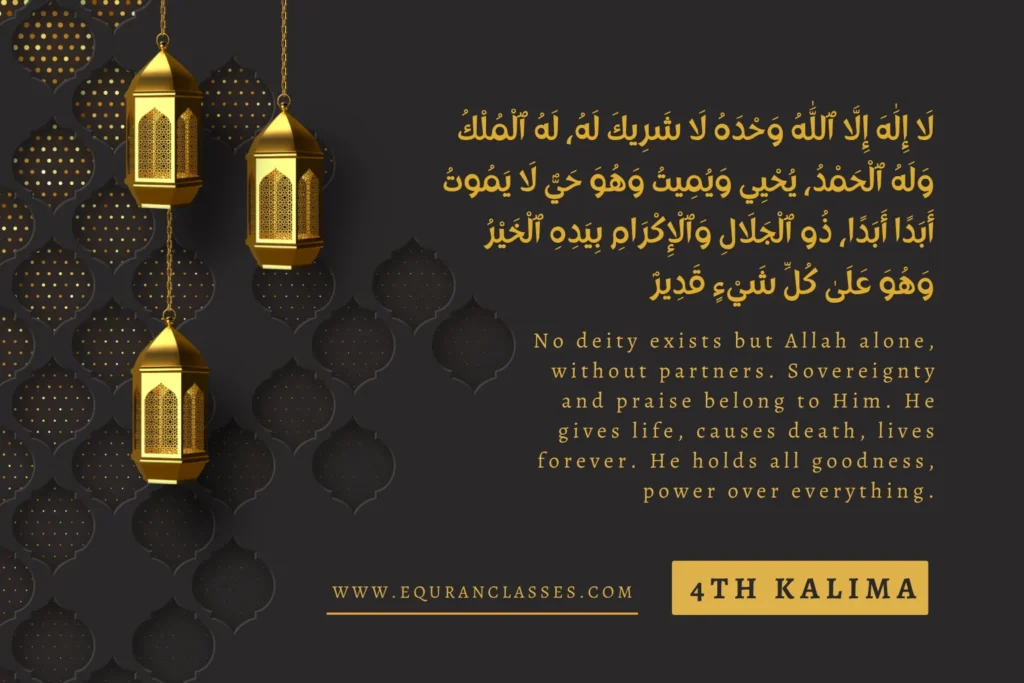
Tauheed strengthens your faith, as Sahih al-Bukhari teaches (Book 97, Hadith 131). Recite it 100 times after Fajr for forgiveness. Kids in Lahore or Chicago find it like a hug from Allah. Our Wifaq tutors teach it. Download our audio guide to learn Tauheed! Join eQuran Classes to shine in faith, Insha’Allah!
Fifth Kalima: Astaghfar (Penitence)
The Fifth Kalima, Astaghfar, seeks Allah’s forgiveness for all sins. Recite it:
أَسْتَغْفِرُ ٱللَّٰهَ رَبِّي مِنْ كُلِّ ذَنْبٍ أَذْنَبْتُهُ عَمَدًا أَوْ خَطَأً سِرًّا أوْ عَلَانِيَةً وَأَتُوبُ إِلَيْهِ مِنَ ٱلذَّنْبِ ٱلَّذِي أَعْلَمُ وَمِنَ ٱلذَّنْبِ ٱلَّذِي لَا أَعْلَمُ، إِنَّكَ أَنْتَ عَلَّامُ ٱلْغُيُوبِ وَسَتَّارُ ٱلْعُيُوْبِ وَغَفَّارُ ٱلذُّنُوبِ وَلَا حَوْلَ وَلَا قُوَّةَ إِلَّا بِٱللَّٰهِ ٱلْعَلِيِّ ٱلْعَظِيمِ
میں اللہ سے معافی مانگتا ہوں جو میرا رب ہے ہر اس گناہ سے جو میں نے جان بوجھ کر یا غلطی سے، چھپ کر یا علانیہ طور پر کیا ہے، اور میں اس سے توبہ کرتا ہوں اس گناہ پر جس کا مجھے علم ہے اور جس گناہ کو میں نہیں جانتا۔ بے شک تو غیب کا جاننے والا، عیبوں کو چھپانے والا اور گناہوں کو معاف کرنے والا ہے۔ اللہ کے سوا نہ کوئی طاقت ہے نہ قوت جو سب سے بلند عظمت والا ہے۔
(ʾastaḡfiru -llāha rabbī min kulli ḏanbin ʾaḏnabtuhu ʿamdan ʾaw k͟haṭaʾan sirran wa-ʿalānīyatan wa-ʾatūbu ʾilayhi mina ḏ-ḏanbi l-laḏī ʾaʿlamu wa-mina ḏ-ḏanbi l-laḏī lā ʾaʿlamu ʾinnaka ʾanta ʿallāmu l-ḡuyūbi wa-sattāru l-ʿuyūbi wa-ḡaffāru ḏ-ḏunūbi wa-lā ḥawla wa-lā quwwata ʾillā bi-llāhi l-ʿalīyi l-aẓīmi). It means: I seek Allah’s forgiveness for every sin, known or unknown, open or secret. I repent to Him, the Forgiver.

Astaghfar cleanses your heart, as Sahih Muslim teaches (Book 35, Hadith 6523). Aisha, a new Muslim in Toronto, found peace reciting it daily. Kids in Islamabad love its calming words. Try our pronunciation quiz to master it! Our female Hafizas guides you. Join eQuran Classes to seek forgiveness, Insha’Allah!
Sixth Kalima: Radd-e-Kufr (Rejecting Disbelief)
The Sixth Kalima, Radd-e-Kufr, guards your faith against disbelief. Recite it:
ٱللَّٰهُمَّ إِنِّي أَعُوذُ بِكَ مِنْ أَنْ أُشْرِكَ بِكَ شَيْءً وَأَنَا أَعْلَمُ بِهِ وَأَسْتَغْفِرُكَ لِمَا لَا أَعْلَمُ بِهِ تُبْتُ عَنْهُ وَتَبَرَّأَتُ مِنَ ٱلْكُفْر وَٱلشِّرْكِ وَٱلْكِذْبِ وَٱلْغِيبَةِ وَٱلْبِدْعَةِ وَٱلنَّمِيمَةِ وَٱلْفَوَاحِشِ وَٱلْبُهْتَانِ وَٱلْمَعَاصِي كُلِّهَا وَأَسْلَمْتُ وَأَقُولُ لَا إِلَٰهَ إِلَّا ٱللَّٰهُ مُحَمَّدٌ رَسُولُ ٱللَّٰهِ
اے اللہ میں اس بات سے تیری پناہ مانگتا ہوں کہ تیرے ساتھ کسی چیز کو شریک کروں اور مجھے اس کا علم ہو اور میں تجھ سے اس چیز کی بخشش مانگتا ہوں جس کا مجھے علم نہیں۔ میں توبہ کرتا ہوں اور برات چاہتا ہوں کفر، شرک، جھوٹ، غیبت، بدعت، چغلی، بے حیائی، بہتان اور تمام گناہوں سے۔ اور میں اسلام لایا اور میں کہتا ہوں کہ اللہ کے سوا کوئی معبود نہیں اور محمد اللہ کے رسول ہیں۔
(ʾallāhumma ʾinnī ʾaʿūḏu bika min ʾan ʾušrika bika šayʾan wa-ʾanā ʾaʿlamu bihi wa-ʾastaḡfiruka limā lā ʾaʿlamu bihi tubtu ʿanhu wa-tabarraʾatu mina l-kufri wa-š-širki wa-l-kiḏbi wa-l-ḡībati wa-l-bidʿati wa-n-namīmati wa-l-fawāḥiši wa-l-buhtāni wa-l-maʿāṣī kullihā wa-ʾaslamtu wa-ʾaquwlu lā ʾilāha ʾillā -llāhu muḥammadun rasūlu -llāhi). It means: O Allah! I seek refuge from knowingly associating partners with You, seek forgiveness for unknown sins, reject disbelief, falsehood, all sins, and declare: No deity exists but Allah, Muhammad is His messenger.
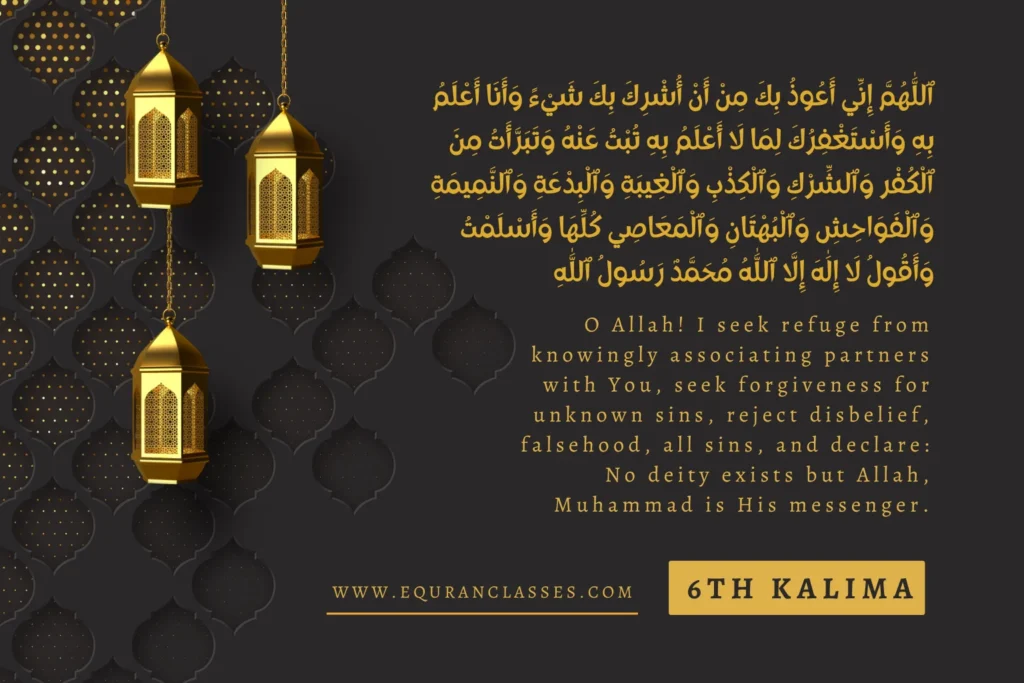
Radd-e-Kufr rejects shirk, strengthening belief, as Mustadrak Hakim confirms (Book 1, Hadith 19). Kids in Birmingham or Karachi feel protected reciting it. Non-Arabic speakers master it with our audio guide for Makharij. Join eQuran Classes to stand firm in faith, Insha’Allah!
Mastering Kalma Pronunciation with Makharij
Mastering the pronunciation of Kalma brings you closer to Allah. Makharij, the articulation points, ensure accurate Arabic sounds. For “ayn” (ع) in the Fifth Kalima, use the middle throat (Wasat Halq), vibrating softly. For “meem” (م) in the First Kalima, press both lips together. The Sixth Kalima’s “haa” (ه) comes from the deepest throat (Aqsa Halq), like a gentle sigh. Urdu and Malay speakers in London or Kuala Lumpur often struggle with throat sounds, but practice helps!
The Origins and Significance of the Six Kalmas in South Asian Islam
The Six Kalmas root your faith in South Asian Islam. Pakistan and India teach them as dhikr and aqeeda tools. Kids in Lahore learn to affirm belief, like Zain, 9, reciting at his madrasa. The 1st Kalma comes from Kanz al-Ummal (Vol. 1, p. 55), the 2nd from Sahih al-Bukhari (Book 2, Hadith 8), the 3rd from Ibn Majah (Book 5, Hadith 925), and the 4th from Tirmidhi (Book 48, Hadith 2438)—the 5th and 6th blend various Hadiths.
Some call Kalmas Bid’a, but they’re Sunnah-based. Their 1–6 order aids learning, not innovation, according to Hafiz Sahb on X. Join eQuran Classes to understand their meaning, Insha’Allah!
Best Times to Recite the Six Kalmas
Reciting the Six Kalmas boosts your worship and faith. Say them after Salah for Allah’s mercy, as Sahih Muslim teaches: “Dhikr protects from harm” (Book 48, Hadith 65). Before sleep, recite the 1st Kalma for Allah’s protection—perfect for kids in London or Islamabad. During daily dhikr, like on a bus in New York, strengthen your heart. Parents in Lahore guide kids to recite before bed. Our Wifaq tutors teach at ideal times. Start reciting now with eQuran Classes, Insha’Allah!
Why Choose eQuran Classes for Kalma Learning?
eQuran Classes offers trusted Quran classes in London, New York, and Lahore. Our Wifaq ul Madaris-certified tutors bring nine years of experience in teaching children and adults with care. Female Hafizas lead ladies-only classes for sisters in Birmingham or Karachi. Our flexible LMS is ideal for busy schedules, making it perfect for new Muslims in Chicago. Kids love our fun methods, like quizzes for Kalmas. Learn the 1st to 6th Kalma online with Muslim-friendly lessons. Start your journey with our free trial, Insha’Allah.
Our Courses: Tailored for Every Learner
eQuran Classes offers courses for all Muslims. Master the Six Kalmas with our daily suplication course. Learn Arabic basics in Noorani Qaida—perfect pronunciation with Tajweed lessons. Memorize the Quran with expert guidance. Understand the meanings through Quran Translation. Ladies-only Kalma classes, led by female Hafizas, empower sisters in London and Karachi. Kids in New York enjoy fun learning methods. Our Wifaq-certified tutors teach beginners online. Start your free trial today, Insha’Allah!
Success Stories from Our Students
Our Muslim students grow in faith at eQuran Classes! Ahmed, 8, memorized all six Kalmas in a month with our live classes. Fatima, a new Muslim in Canada, mastered Tajweed with our Wifaq-certified tutors. In Pakistan, parent Sana saw her kids excel in Quran Translation. A teen in the UK aced Kalma pronunciation with fun quizzes. Our learning inspires hearts worldwide.
